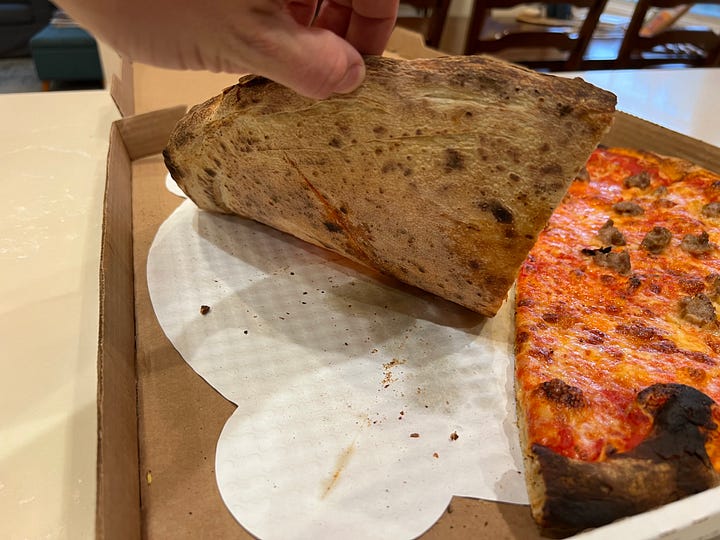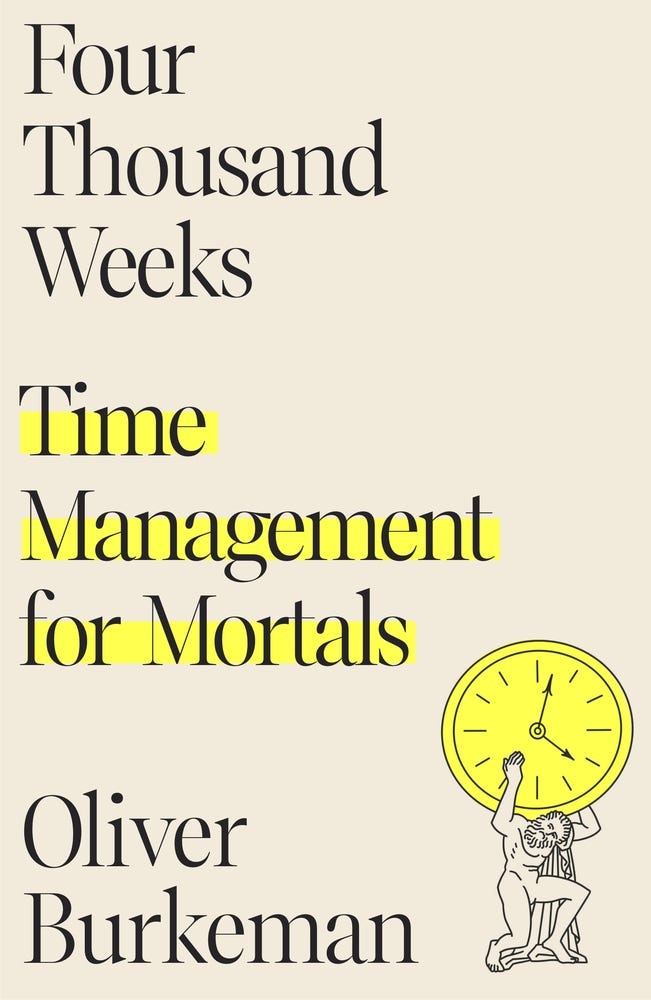The Reverse Bucket List
Attachment, intention, and attention: How a reverse bucket list helps to reframe the endless pursuit of achievement that ultimately leaves us feeling empty
Come with me on a trip down memory lane. It’s 2005 and Tom Brady has just led the New England Patriots to their third Super Bowl victory in four years. At 27, he’s on top of the world of football. Not even three decades deep, he’s locked himself in as a no-doubt future member of the Pro Football Hall of Fame. He’s accomplished what every kid dreams about playing® football in their backyard three times over…and yet, something’s missing. Here’s Tom talking to Steve Kroft on 60 minutes in 2005.
BRADY: Why do I have three Super Bowl rings, and still think there's something greater out there for me? I mean, maybe a lot of people would say, "Hey man, this is what is." I reached my goal, my dream, my life. Me, I think: God, it's gotta be more than this. I mean this can't be what it's all cracked up to be. I mean I've done it. I'm 27. And what else is there for me?
KROFT: What's the answer?
BRADY: I wish I knew. I wish I knew. I mean I think that's part of me trying to go out and experience other things. I love playing football, and I love being a quarterback for this team, but, at the same time, I think there's a lot of other parts about me that I'm trying to find. I know what ultimately makes me happy are family and friends, and positive relationships with great people. I think I get more out of that than anything.
Brady’s question and the human experience
Brady’s question “What else is there for me?” is so human. It is part of all of our stories, even if many of us don’t say it out loud. While few of us will reach the level of achievement in our careers as Brady did in his time playing quarterback in the NFL, we all have experienced in at least some small way that feeling where we’ve achieved something we dreamed about ultimately to be left wanting more.
To be human is to worship. The only choice we have in the matter is what we worship. From Augustine and his description of our restless hearts to Bob Dylan and his song “Gotta Serve Somebody” the refrain echoes from many corners of culture.
One of my favorite descriptions of this need to worship is from David Foster Wallace’s famous commencement speech “This is Water” delivered just several months after Tom Brady shared those thoughts on 60 Minutes. In his speech he writes:
[I]n the day-to-day trenches of adult life, there is actually no such thing as atheism. There is no such thing as not worshipping. Everybody worships. The only choice we get is what to worship. And the compelling reason for maybe choosing some sort of god or spiritual-type thing to worship–be it JC or Allah, be it YHWH or the Wiccan Mother Goddess, or the Four Noble Truths, or some inviolable set of ethical principles–is that pretty much anything else you worship will eat you alive. If you worship money and things, if they are where you tap real meaning in life, then you will never have enough, never feel you have enough. It’s the truth. Worship your body and beauty and sexual allure and you will always feel ugly. And when time and age start showing, you will die a million deaths before they finally grieve you. On one level, we all know this stuff already. It’s been codified as myths, proverbs, clichés, epigrams, parables; the skeleton of every great story. The whole trick is keeping the truth up front in daily consciousness.
What are you worshipping and how do you know it’s worthy of your worship? And once you find something to worship that doesn’t crush you under its weight, how do you “keep the truth up front in daily consciousness” as Wallace suggests? Enter Arthur C. Brooks and the reverse bucket list.
Arthur C. Brooks and the Reverse Bucket List
This train of thought got started when I listened to Arthur C. Brooks’ episode on the Tim Ferriss show a few weeks ago. Brooks is an author, public speaker, and academic who studies happiness as a professor at the Harvard Kennedy School and the Harvard Business School. In addition to his work as a social scientist and an academic, he is a contributing writer at The Atlantic and co-author of a new book, Building the Life You Want: The Art and Science of Getting Happier, with Oprah Winfrey.
Brooks covered a lot in his wide-ranging conversation with Tim, but one piece that has been sticking with me is the idea of a reverse bucket list and how it can help us avoid unhealthy attachment to our good but not ultimate goals, understand and shape our intentions, and focus our attention on what really matters.
The bucket list contains our idols in disguise
The impulse to build a bucket list is deeply human—we all have material possessions we wish to acquire, experiences we want to have, or professional goals we want to achieve. It’s only natural that we should list those out and be clear about what we’re striving towards. The problem however, as Brooks and other incisive cultural critics like David Foster Wallace point out, is that these objects of our desire can end up imprisoning us. We need to be careful that we pay attention to the ways that the things we chase after shape and distort us as we pursue them.
In many ways, the bucket list is just a modern way to describe our human tendency toward idolatry. The items on our bucket list are what we think will bring us satisfaction, fulfillment, and meaning. In other words, they are indications of what we worship. Unfortunately, just like Tom Brady, we’ll find out sooner or later that achieving our goals isn’t all it’s cracked up to be. Like Tom, we’ll likely conquer our goals to find ourselves asking what’s next. Brooks helps to highlight why this is the case, drawing from a variety of sources including Buddhist teachings and his own Catholic religious practice: our hearts are idol factories. We can’t help but fall into their trap.
In an exercise that Brooks runs with his students at Harvard and runs live on the podcast with Tim, he identifies four main areas to be wary of: money, power, fame, and pleasure. Inasmuch as the goals on our bucket list are aligned with these areas of idolatry, we’ll end up achieving the goals only to feel emptier and less fulfilled. In contrast, what really helps us to achieve lasting fulfillment is to pursue virtues like love, curiosity, patience, justice, and peace. These are the pursuits that lead to true and lasting happiness.
The reverse bucket list helps us to detach from our idols
So what given our predicament, what are we to do? As the author of a weekly column How to Build a Life, Brooks is a good one to ask. He suggests that one helpful strategy is to develop a reverse bucket list.
The concept is simple. After creating your bucket list, go through each item on it and visualize yourself achieving it. Then, cross it off. The idea is rooted in Brooks’ model of happiness as “haves” divided by “wants.” He argues that we can make ourselves temporarily happier by having more or permanently happier by wanting less.
So many of the items on our bucket lists are geared toward making the numerator of this equation bigger: the newest iPhone, a promotion with more power or a higher salary at work, or recognition for our work in a prestigious venue. But these “haves” just don’t last. We might feel enjoyment for a minute, but ultimately it will fade and we’ll be looking for the next thing to chase.
The solution instead is to find a way to avoid the illusion of haves and develop the virtue of contentedness, finding enough and managing our desires to want less.
A secondary benefit, as Brooks explains in the video below, is that the reverse bucket list also has neurophysiological validity. By explicitly assessing our goals, we can move them from the more emotional and subconscious areas of our brains to the prefrontal cortex where we can rationally process and manage them. By making them explicit, we can consider how our goals are aligned with one or more of the categories of idolatry, and by explicitly bringing this to mind, better understand that deception.
Prototype a reverse bucket list to detach yourself from the idols of money, power, fame, and pleasure
The reverse bucket as a tool isn’t a magic bullet, but I think it can be a helpful tool. It’s important to note that you’re still striving after the goals on your reverse bucket list. The point is to create an intentional practice of realizing that those goals, while worthy, will ultimately not satisfy us unless they are aligned with deeper virtues.
Where do you find meaning?
What did Tom Brady’s bucket list look like at the start of his career? I bet it would have included a lot of items that he ended up checking off: Lombardi trophies, more money than he probably will ever know what to do with, and a place among (if not at the top) of the list of the greatest football players to ever have walked this earth. There’s nothing wrong with striving for greatness. But unless we want to end up in the same spot as Tom was in 2005, asking whether there is more to life than achieving everything we could have dreamed of, we should carefully consider how to detach ourselves from the idols towards which our hearts are so often inclined: money, power, fame, and pleasure. These ultimately will not satisfy. The question is, what will?
At the end of the day, we can’t escape the fact that we all worship something. While a reverse bucket list can help us to see what we ought not to worship, it doesn’t explicitly tell us what to worship. As a Christian, I find my meaning in Jesus’ call to “Love the Lord your God with all your heart and with all your soul and with all your mind and with all your strength” and to “love your neighbor as yourself.” As you ponder what Brooks has to say about reverse bucket lists as a tool to explore sources of meaning, I hope you’ll spend a few moments to consider what questions this raises for you and how you might detach yourself from the idols that promise, but never deliver, a lasting source of meaning and happiness.
Do you have a thought, comment, or reflection to share? I’d love to hear it.
The Book Nook
A few weeks ago I picked up Four Thousand Weeks by Oliver Burkeman. I found lots of insightful nuggets in this book, mostly focused on how we so often focus on efficiency and productivity without really thinking about whether those are variables worth optimizing for in the long run. A few quotes that resonated:
Every decision to use a portion of time on anything represents the sacrifice of all the other ways in which you could have spent that time, but didn’t—and to willingly make that sacrifice is to take a stand, without reservation, on what matters most to you.
Convenience culture seduces us into imagining that we might find room for everything important by eliminating only life’s tedious tasks. But it’s a lie. You have to choose a few things, sacrifice everything else, and deal with the inevitable sense of loss that results.
The real measure of any time management technique is whether or not it helps you neglect the right things.
Attention, on the other hand, just is life: your experience of being alive consists of nothing other than the sum of everything to which you pay attention…So when you pay attention to something you don’t especially value, it’s not an exaggeration to say that you’re paying with your life.
Because the attention economy is designed to prioritize whatever’s most compelling—instead of whatever’s most true, or most useful—it systematically distorts the picture of the world we carry in our heads at all times.
“Because children grow up, we think a child’s purpose is to grow up,” Herzen says. “But a child’s purpose is to be a child. Nature doesn’t disdain what only lives for a day. It pours the whole of itself into each moment … Life’s bounty is in its flow. Later is too late.”
The Professor Is In


Last Thursday featured the summer research poster celebration at Harvey Mudd. On the last count, ninety-one students presented posters about their work over the summer. Here you can see Ashrit and Ellie standing beside the posters they prepared along with their summer teammates Zoe and Jose. So proud of the work that they did this summer!
Leisure Line




PhD Pies took a weekend off from pizza making for some local inspiration. We picked up a pie from the new place in town, Prime Pizza. Really nice to have some good New York-style pizza close to home!
Still Life
A small frog we spotted on a family outing at the Riparian Zone near the Jet Propulsion Laboratory (JPL) in Pasadena. Hard to get the sense of scale, but the frog couldn’t have been much bigger than a quarter.






This was really interesting to read since I've been dealing with a similar issue! The idea in theory makes sense, but how does one go about "convincing" themselves that they want something less? Clearly, doing the reverse bucket list won't immediately have that affect—so what other steps can one take in that direction to reduce the wants?
Four Thousand Weeks is a favorite of mine! Probably one of the best books I read last year and one I definitely intend to revisit- thanks for sharing the quotes that stood out to you and reminding me why I loved it so much.